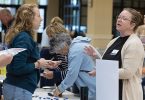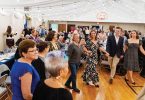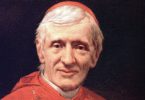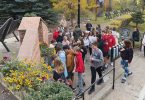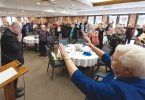by Steve Buckner
Special to The Leaven
Greater love has no one than this: to lay down one’s life for one’s friends” (Jn 15:13).
LANSING — When he glanced at his Facebook newsfeed on Feb. 14 that read “Shooting at Florida high school,” Michael Connell had no idea how close to home the tragedy had struck.
Connell, a part-time security guard at the University of St. Mary in Leavenworth, soon learned the awful truth in a phone call from his younger brother, Ray Feis: The shooting had occurred at their alma mater, Marjory Stoneman Douglas High School in Parkland, Florida.
Worse yet, their brother, Aaron Feis, an assistant football coach and security guard at the school, had been shot by the gunman. Aaron, 37, would die later that day.
By all accounts, Aaron had heard the gunfire, raced toward it, shielded students, pushed a girl out of harm’s way and then confronted the shooter, who shot him three times.
“Aaron was selfless and always put others first,” said Connell, 42. “He always looked out for somebody else. He was always there — constant and consistent.
“He lived for the students and lived for helping people out. You ask anybody. It’s so consistent what everybody is saying [about him].”
“You knew what you were getting with Aaron,” Connell added. “He was caring and passionate and decisive. When he saw something and thought he should do something, he would do it.”
Brotherly love
Though five years and miles apart, Connell and Feis were close. They kept in touch via Facebook, text messages and twice-monthly phone calls. They depended on each other.
“He had his hard times, I’ve had my hard times,” Connell said. “We’d talk to each other every now and then when one of us was going through something.
“We supported each other. We’d talk through solutions for each other.”
Connell added that Feis was nonjudgmental of people.
“That’s not to say he didn’t have his own beliefs, but he didn’t force that on anybody,” Connell said.
Once, when they were boys, Aaron jumped on his father’s back to prevent him from disciplining his older brother. Aaron was always protective of others, Connell said, even as a child.
“And, that’s exactly what he did for those kids,” Connell said. “It was his whole life like that. It was part of his character.”
In their last text message exchange before the tragedy, Connell outlined a problem he was having with some people to Aaron.
“He asked what I did about it,” Connell said. “We gave each other advice.”
The void
The quiet life that Feis led ended on Feb. 14. Shortly after learning from his brother that Aaron had been shot, Connell’s phone started “blowing up” with calls from family and friends.
“My brother, sister and stepdad, all . . . had been brought to an FBI office,” Connell said. “They had been looking for Aaron [at hospitals]. They didn’t find out he died until 11:30 p.m.”
Their mother had been traveling to Parkland when Connell had to call her and break the news that Aaron had died.
“I didn’t know what to say,” said Connell. “Usually, I’m the one my family calls when there is a problem. But I was speechless. I was in shock that first day.”
Three days after the tragedy, Connell still has trouble explaining his emotions.
“I’m going between shock, feeling numb and feeling sad,” he said. “It’s waves of emotion.”
Hope from heartache
“It hurts. It hurts a lot,” Connell said. “It helps to have the support of my family, my wife and kids (two daughters, who are 8 and 10). My band — they’ve been very supportive.
“The community, and even around the world — I’m amazed by how much his selfless act is drawing so much attention. Which I think is good, to focus on the good of this horrible event.”
The university has “absolutely” been supportive of him, he said. They gave him time off after the tragedy and then allowed him more time off so he could attend his brother’s funeral in Florida.
Connell especially credits his boss, Donald Stubbings, Sister Diane Steele, president of St. Mary’s, and the school’s chaplain, Father Bill McEvoy, for helping him get through the days after the shooting.
The university gave Connell a gift card to help him pay for meals while in Florida and offered to pay his airfare there. But Southwest Airlines comped the Connell family’s airfare so all four of them could fly round trip to Florida for free.
Connell knows there will be many difficult days to come.
But there is some comfort.
“One thing that helps is that his character helps out with the ‘Why?’,” concluded Connell. “He had a purpose. He died protecting people.
“Knowing that helps me accept it.”


